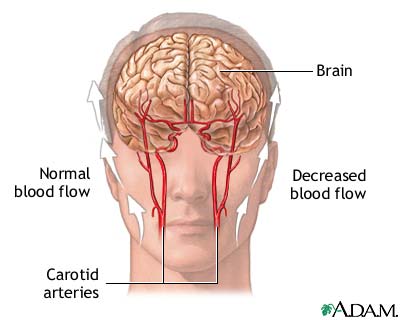


 |  |  |
| | ||
Transient Ischemic attack (TIA)

A transient ischemic attack (TIA) is caused by a temporary state of reduced blood flow in a portion of the brain. This is most frequently caused by tiny blood clots that temporarily occlude a portion of the brain. A primary blood supply to the brain is through two arteries in the neck (the carotid arteries) that branch off within the brain to multiple arteries that supply specific areas of the brain. During a TIA, the temporary disturbance of blood supply to an area of the brain results in a sudden, brief decrease in brain function.
Update Date: 9/16/2008 Updated by: Daniel B. Hoch, PhD, MD, Assistant Professor of Neurology, Harvard Medical School, Department of Neurology, Massachusetts General Hospital. Also reviewed by David Zieve, MD, MHA, Medical Director, A.D.A.M., Inc.
